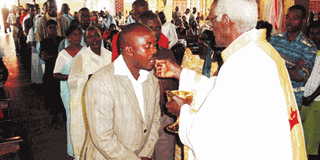Prime
How often should one attend mass

What you need to know:
“Every time we celebrate mass, we bring into real presence the sacrifice of Jesus Christ on the cross. Therefore, saying mass is the highest form of prayer and the more times the better,” says Monsignor John Wynand Katende
“It is like eating food,” a staunch female catholic said about attending mass. “I attend mass three times a day; morning, afternoon and evening, just like I have three major meals in a day - breakfast, lunch and supper.”
It started in born again churches, which have early morning prayers dubbed “morning glory”, afternoon prayers called “lunch hour fellowships” and the evening prayers called “evening glory”. However, after the Vatican Council of 1962-65, a Catholic priest was allowed to say mass as many times as possible in the day for pastoral reasons. This led to the rise of morning, afternoon and evening mass for the Catholic Church. Before the council, a priest was only allowed to say mass once a day.
“Every time we celebrate mass, we bring into real presence the sacrifice of Jesus Christ on the cross. Therefore, saying mass is the highest form of prayer and the more times the better,” says Monsignor John Wynand Katende, the spokesman of Kampala Archdiocese.
How many times should one attend mass? Cardinal Emmanuel Wamala, the retired Archbishop of Kampala Arch-Diocese, says there is no law in the Catholic Church about attending mass on other days save Sunday.
“If one can’t make it for mass any day of the week, there is no law that person is breaking, but it is a grave obligation to attend mass on Sunday. Those who attend mass on a daily basis just have a special love and understanding of their faith,” he says.
William J. Bradley, author of Catholic Missions leaflets, says, “When we go to mass, we tell the world around us who we are and what we represent. Going to mass makes us all evangelists to our family, friends, neighbours and the community in which we live.
He adds that attendance of mass is not just simply joining a social or community action taking place in a certain type of building. We are actually and formally worshipping God in a community setting. “At this time we can thank Him for His many graces and favours to us over the past week and beg His indulgence for needs that are coming in our own lives and the lives of our family and community.”
However, if your work schedule or other appointments do not give you chance to attend mass on a daily basis, lose not thou heart. There are alternatives you could consider. Cardinal Wamala says the Catholic Church offers so many prayers one can use to pray by themselves from either home or at work.
However, Msgr. Katende says someone should follow the readings of the word of God and meditate on them although they will miss sharing the sacrifice of the son of God received through the Holy Communion.
Bradley adds that unless we are ill, aged or shut in, mass is the only time when we get the opportunity to go forward and receive the body and blood of Jesus Christ from the hands of the Eucharistic Minister.
“This is not simply a memorial of the Last Supper. The wafer we receive is not a rite of remembrance but the most real body and blood of Jesus Christ. Jesus said very clearly in the Gospel of John: “Unless you eat the flesh of the Son of Man and drink His blood, you do not have life within you... My flesh is true food and my blood is true drink. Whoever eats my flesh and drinks my blood remains in me and I in him... who feeds on me will have life because of me.” (Jn.6:53, 55-57).
It is important to practice your faith in all situations. It may not be daily but whenever chance avails its self, go use it. If you find attending mass a burden, find someone you can be accountable to or take part in a church activity in which your absence would affect the whole group, for example the choir or ushering.


